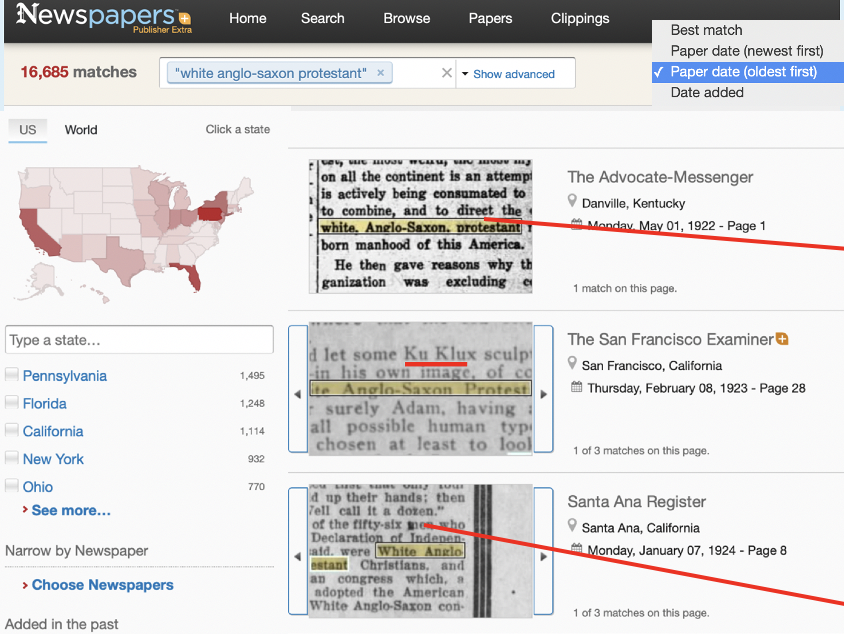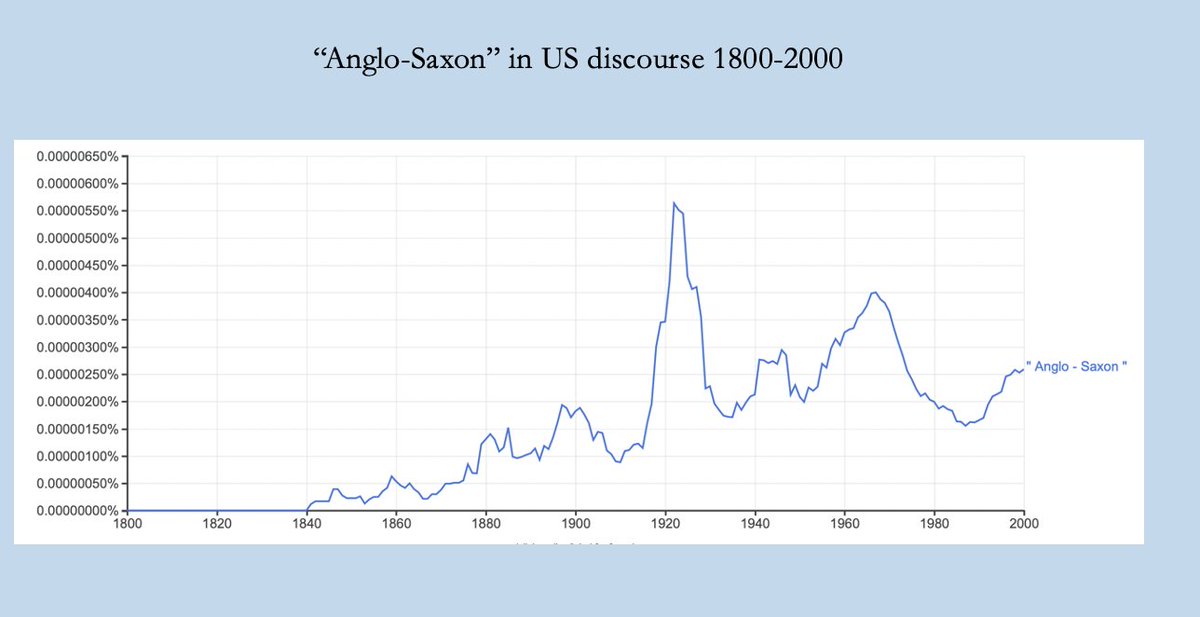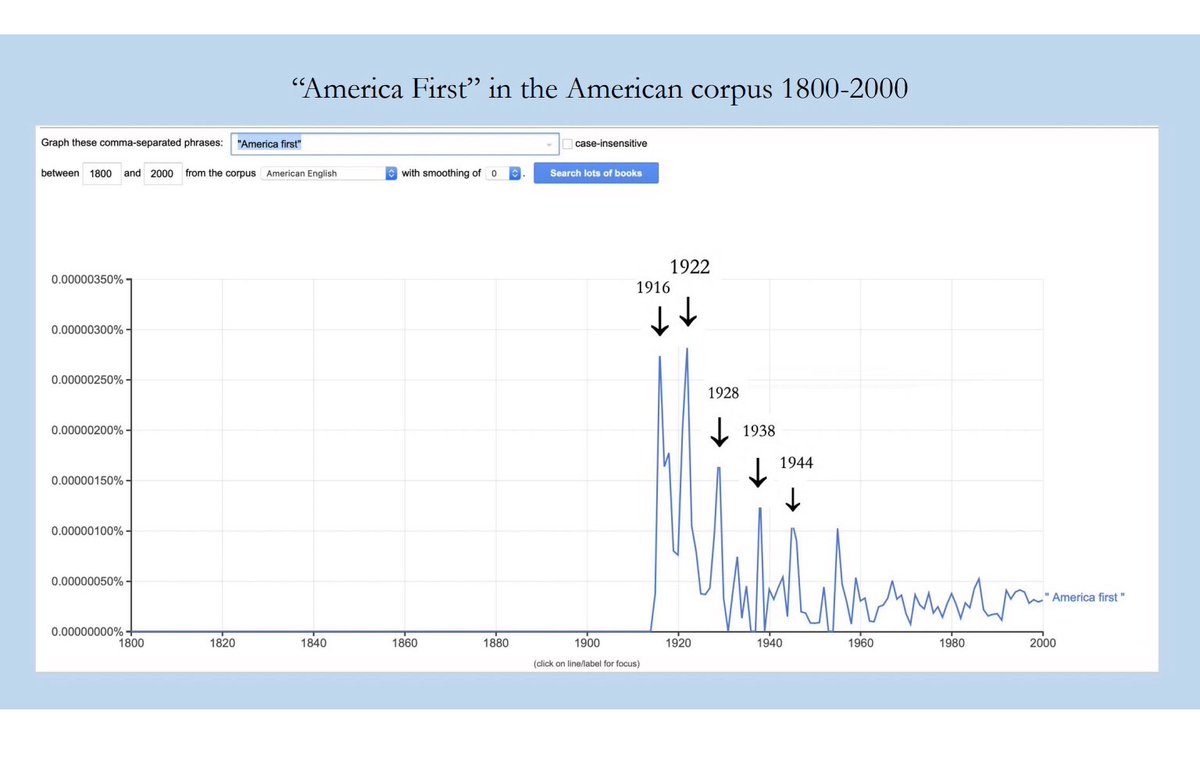"America First" movements have been claiming to protect America's uniquely "Anglo-Saxon" identity for a century. A thread.
washingtonpost.com/politics/2021/…
washingtonpost.com/politics/2021/…
The phrase America First was popularized in 1915, when Woodrow Wilson used it in a speech to the nativist DAR, urging that Americans subject "hyphenate" Americans (German-American, Italian-American, Irish-American) to loyalty tests. 

1915 was the same year the second Klan was born, thanks largely to the popularity of The Birth of a Nation, released earlier that year, but also spurred by the lynching of Jewish Leo Frank that summer. 

By the early 1920s, America First was a wildly popular slogan, used in the presidential campaigns of 1916, 1920 and 1924. Hearst frequently flew it above his masthead, including as a slogan to keep America out of the League of Nations, and to oppose labor unions. 

America First was used to support the explicitly eugenicist anti-immigration bills of the early 1920s, designed to keep people of "lower stock" out of America and protect its supposed "Anglo-Saxon" identity. This speech from 1923 by no coincidence includes "the negro problem." 







At exactly the same time the second Klan had been expanding. It adopted "America First" as its favorite slogan, along with "100% American" (ie, not "hyphenate"). It also didn't like "Negroes" or labor organizers. This is from a Klan march in Louisiana in 1922. 



Here is a Klan recruitment ad, also from 1922, in which they make America First their slogan for the white supremacism (and Christian nationalism) they endorse. 

It is also at exactly this moment that "Anglo-Saxon" emerges into the popular American conversation. If you look for "White Anglo-Saxon Protestant" in the American press before 1900, you won't easily find it, because it wasn't used. 

But if you look for the first uses of "White Anglo-Saxon Protestant" in the American press in a simple search, guess who pops up with it? That's right, it's the Klan, in the early 1920s. 





Google Ngram viewer shows us how the use of "Anglo-Saxon" in American discourse gradually increased over the 19th century (along with the scientific racism it supported), until it explodes in the American corpus in the 1920s. 

Soon promises to protect America First and the Anglo-Saxon race from hordes of undesirable immigrants and "the negro problem" were everywhere. This is also from 1923, as anti-immigration bills were being passed. 



I could go on and on; I have written and lectured about this at length. My point is simple. This is not implicit. It is not accidental. It is deliberate, clear, explicit, and a century old. Same old song, different white supremacist singing.
If you're interested in more context, I've written more about the invention of supposed "Anglo-Saxon" identities in America here. prospectmagazine.co.uk/magazine/white…
I've written more about the eugenicism of early 1920s anti-immigration restriction, and its associations with America First, here. nybooks.com/articles/2019/…
And finally much of this is covered in my book, Behold, America, which is a history of the phrase "America First." None of this stuff is new. None of it is subtle. Its white supremacism is real, and it is deadly serious.
If you’re interested more in how it evolved through the 30s and Lindbergh and the America First Committee of 1940-41, I write about that at length in my book, but also here nybooks.com/daily/2020/06/…
And here newstatesman.com/international/…
And especially here, though it’s paywalled. the-tls.co.uk/articles/the-p…
I gave a 10 min explainer video about it here for @BritishAcademy_
I wish these people would stfu so I could talk about something else, frankly. Sadly they’re gaining momentum, not losing it.
A few people have queried one of the tweets above & I realize at looking it over that I misspoke, apologies. As this has taken off, I should clarify the tweet below. “Anglo-Saxon” *per se* entered the American conversation much earlier, of course. I meant *this* pop conversation. 

A few people have queried one of the tweets above and I realize at looking it over that I misspoke, apologies. As this has taken off, I should clarify. "Anglo-Saxon" *per se* in the popular American conversation is of course, much older, as I note in the Ngram tweet. 

The history of "Anglo-Saxon" in America is what I wrote about in the Prospect essay I linked to, if you want clarification. Here are a few bits: 





Just for sticking around, some bonus images. Here is a comparison of Anglo-Saxon race in American English and British English over the same period. 



And lastly sorry for the duplicated tweet but I was having WiFi issues. Will leave it for clarity’s sake.
• • •
Missing some Tweet in this thread? You can try to
force a refresh









